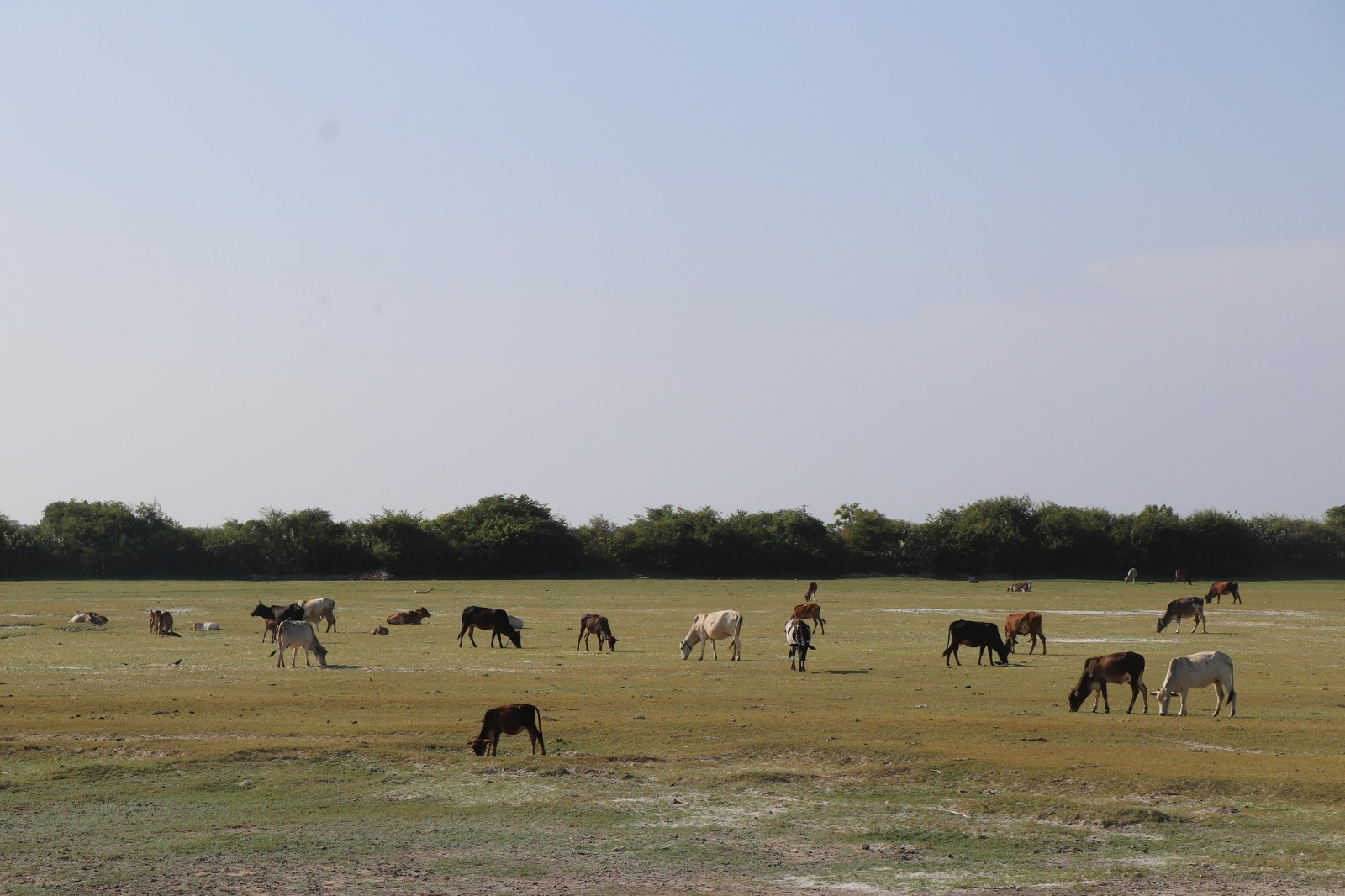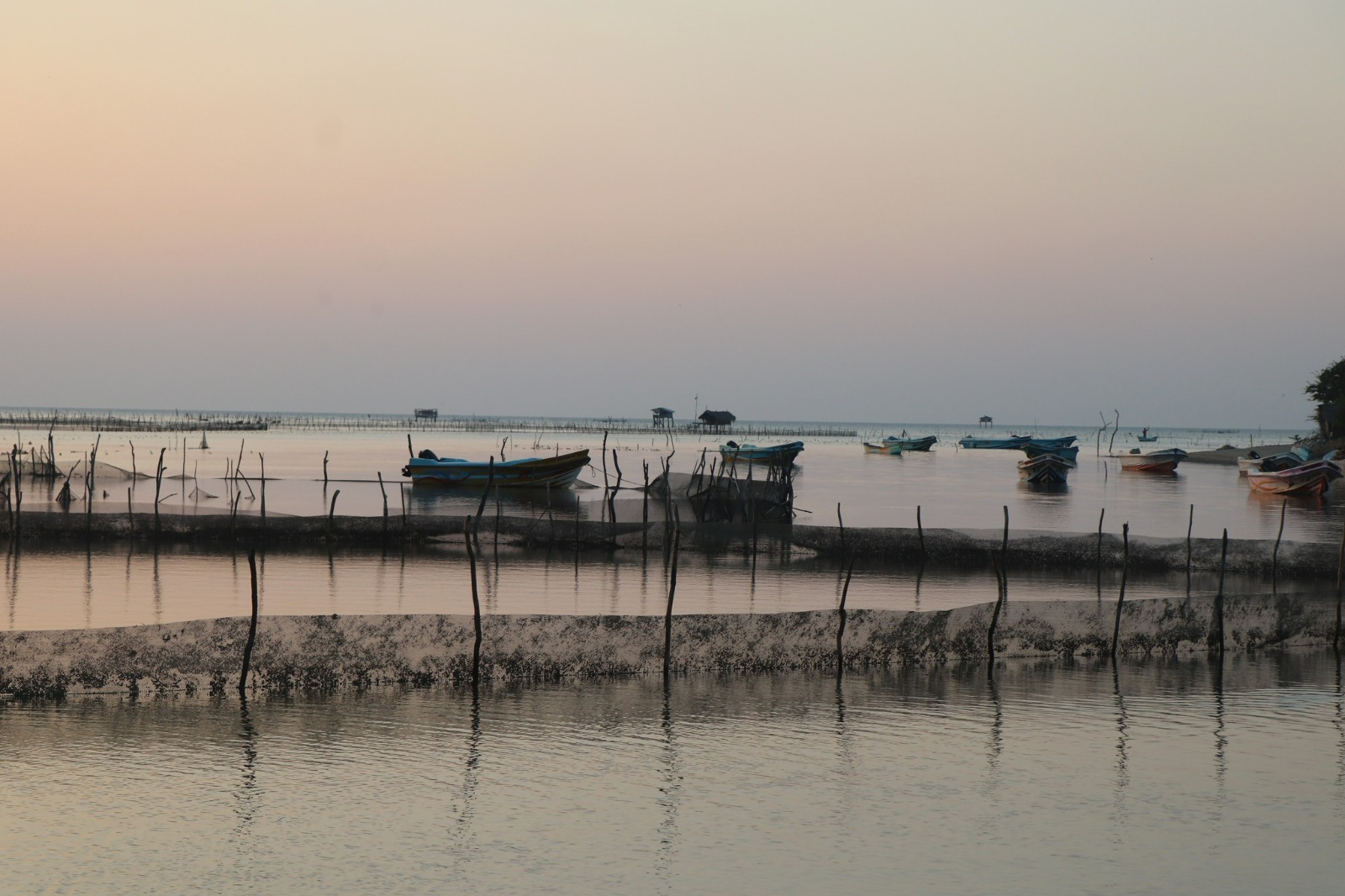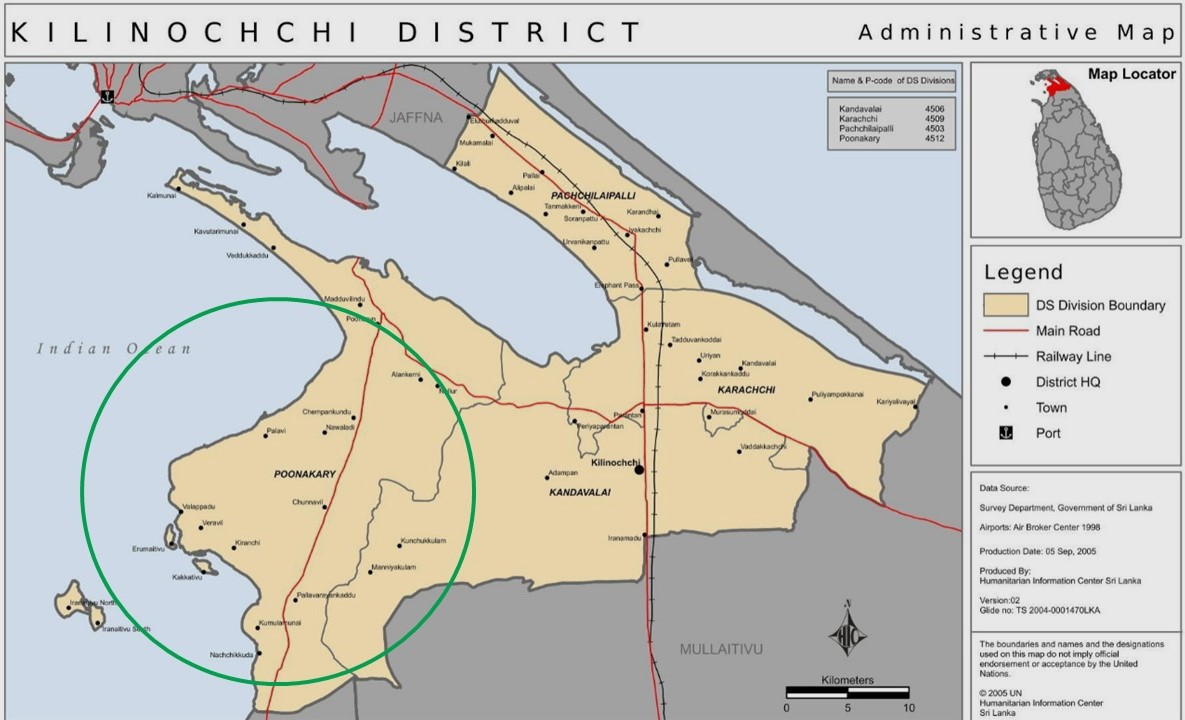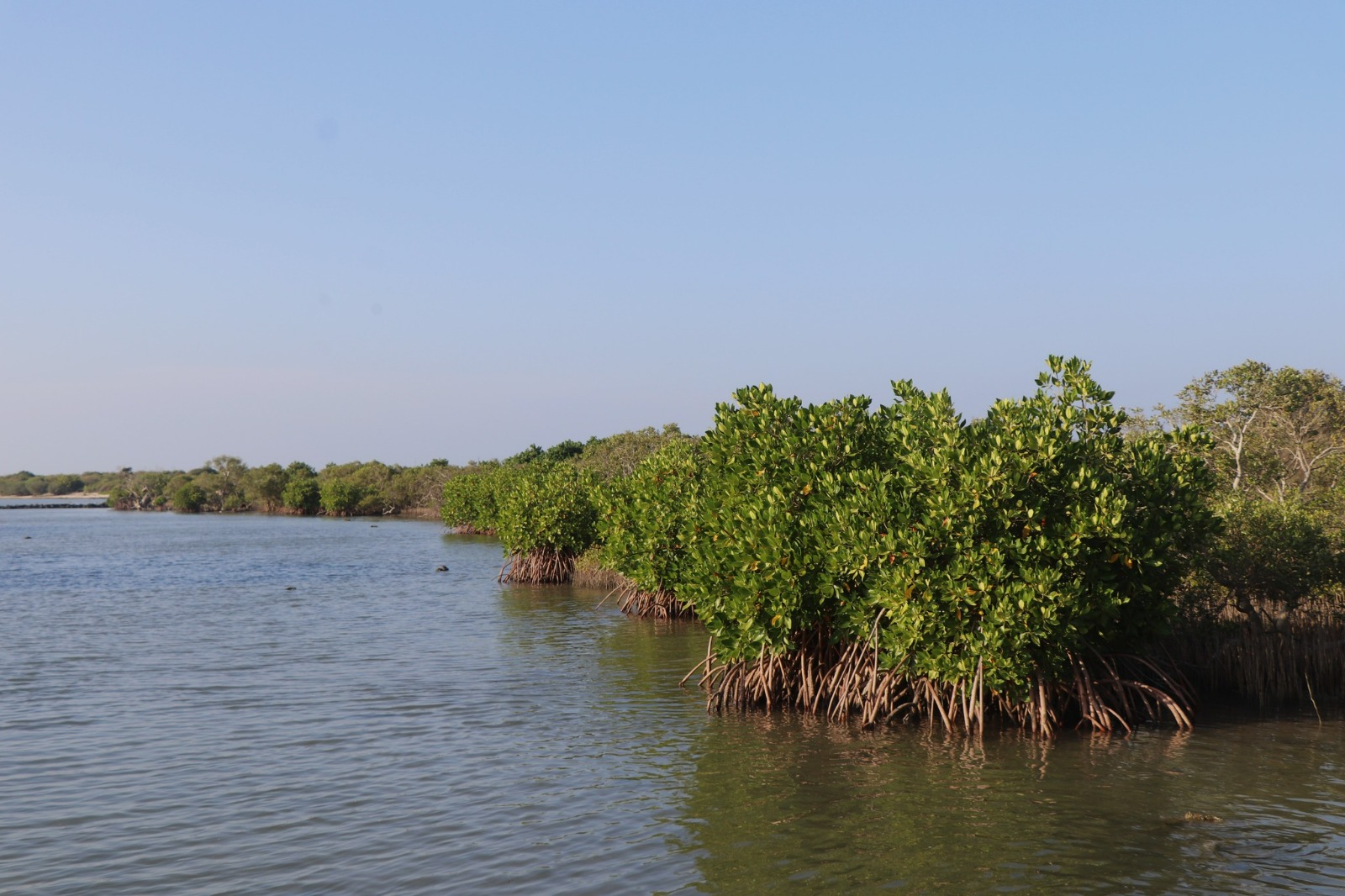Tokyo Cement Company and Douglas Devananda forcibly acquire 3,000 acres of farming, fishing and forest lands in Killinochchi for cement production.
Tokyo Cement Company, under the political protection of Douglas Devananda, Minister of Fisheries, is planning to forcibly acquire 3,000 acres of land located in the two Grama Niladhari Divisions named Ponnavalli and Kiranchi of Poonarin Divisional Secretary's Division in the Kilinochchi District and to establish a cement factory by mining limestone in the area. It has been planned to use an area of 3,000 acres of land including farmlands, lagoons, mangrove systems, salt marshes and forests for this project. This project has been planned to be implemented as an investment project of US$ 500 million.
Arrangements are being made to implement this project by forcibly acquiring lands belonging to the people engaged in agriculture, fishery and animal husbandry, and thereby displacing those people. Although no approval has been obtained for this project, the foundation stone has been laid for the construction of the factory and the office complex.
On July 20, 2012, the mineral exploration licence numbered EL/213/R/3, which has a validity period of 24 months, has been issued by the Geological Survey and Mines Bureau for carrying out the exploration work required for mining limestone, which is the main raw material used in the production of cement. Using this exploration license, Tokyo Company has done about 150 underground drillings covering the entire project area in Ponnavali and Kiranchi Grama Niladhari divisions and has carried out exploration activities. Underground drillings have been done covering the people's paddy lands and salt marshes. While these underground drillings were being done, Tokyo Company and the Geological Survey and Mines Bureau had made it a point to hide from the people the information related to underground mining and information related to the establishment of a cement factory.
While excavations were being carried out for the exploration work, the land between Nagamunai and Valaipadu in Ponnavalli and Weravillu area has been acquired for the construction of the cement factory, and the preliminary construction work has been carried out, too.

Loss of livelihoods caused by the Tokyo Company
Around 1,300 families live in the villages of Palaavi, Valaipadu, Ponnavalli and Veravil in the Ponnavalli Grama Niladhari Division, and around 1,800 families live in the villages of Mottayankulam, Sivapuram, Kirindavanam and Kiranchi in the Kiranchi Grama Niladhari Division. The main livelihood of the people of Palaavi, Ponnavalli, Veravil, Mottayankulam and Sivapuram villages is agriculture. The people of Valaipadu, Palaavi and Kirindavanan villages mostly engage in fishing, and they cultivate coconut as well. A lot of people in Ponnavalli, Valaipadu and Veravil villages engage in animal husbandry.

The people who are engaged in agriculture grow paddy in the Maha season, and they cultivate crops such as onion, banana, manioc, long beans (Ma Karal), brinjal, groundnuts, and black gram as high land crops. These areas receive rain from the north-east monsoon, and the people cultivate paddy in the Maha season using rainwater. Those who engage in fishing cultivate sea cucumber and seaweed in the lagoons for export, and they also catch fish and crabs for export. Close to the lagoon, there also are people who engage in small-scale fishing and those who engage in fishing using trawler boats in the lagoon. The people who are engaged in animal husbandry mainly rear dairy cattle and goats. There are about 20,000 dairy cows and about 10,000 goats in this area.

The people of this area, who are engaged in agriculture, fishery and animal husbandry, live a prosperous life and live their lives without any problem. The only problem they have is that they have to buy water due to the salinity of the groundwater in this area. The people of this area have protected the mangrove forests, salt marshes and the coastal forest areas as well as the forest system that lie around the village not because it has been declared as a reserve, but because of their own understanding of the importance of those ecosystems, and hence, all these ecosystems have been protected since time immemorial. Although elephants live in this area, the main reason as to why no human-elephant conflict is reported form this area is that these ecosystems, the habitats of the elephants, have been well-protected.
However, with the implementation of the said project, all these conditions will completely change, and everything including forests, lagoons, salt marshes and farmlands will be destroyed, and it will result in a serious breakdown of the lives of the people.
Due to mining of limestone near the salt marshes for the production of cement, large pits will be formed, and when those pits get filled with salt water, the salinity level of the ground water in this area will increase, and consequently, the farmlands in this area will be destroyed and the farming-based lifestyles of the people will completely collapse.
People who are engaged in animal husbandry use the salt marshes and the related grasslands as grazing fields for their dairy cattle and goats. When all these lands are used for mining limestone, the animal-husbandry-based livelihood of the people in this area will be completely destroyed. Apart from that, when the land areas including the forests in this area are cleared for this project, the habitats of the wild elephants will get fragmented and will get limited resulting in the creation of a human-elephant conflict, which is new to this area and which will disrupt the lives of the people in this area.
The biological-systems being destroyed by the Tokyo Company
The state forest named Weerapandianmunai Forest, which is in extent of 227 hectare (568 acres) and managed under the Department of Forest Conservation, is located within the area to be acquired for the said project. This forest system is connected to the coastal forest belt as well as to the lagoon-related mangroves. This entire area provides habitat for elephants. The Weerapandianmunai lagoon, Nagamunai mangrove system and the Kovilkada salt marsh system, which are located in this area, are breeding places for the lagoon and shallow water sea fish, prawns and crabs. Further, these saline ecosystems are a key area where various species of migratory birds hunt for their prey. It is in this area that most of the salt marshes and mangrove forests in the Kilinochchi district are spread.
True mangroves such as Manda (Avicennia marina), Beriya (Lumnitzera racemose) Kadol (Rhizophora mucronata), Mal Kadol (Bruguiera gymnorrhiza), and Averi Kadol (Aegiceras corniculatum) can be found in this area. Many species of resident and migratory birds can be seen in these lagoons and salt marshes. They include bird species such as Uswatuwa (Grey Francolin), Pandu Tharawa (Ruddy Shelduck), Dethith Tharawa (Indian Spot-billed Duck), Mattikawa (Eurasian Oystercatcher), Kakulu Oleiya (Crab Plover), Evasetta (Pied Avocet), Alu Oleiya (Grey Plover), Caspian Oleiya (Caspian Plover), Daara Mahavatuva (Bar-tailed Godwit), Dethadu Watuwa (Whimbrel), Maha Dethadu Watuwa (Eurasian Curlew), Paa Rathu Pulli Siliwatuwa (Spotted Redshank), Rathu Maha Siliwatuwa (Red Knot) and Weli Kirala (Indian Courser). The migratory bird species that come to Sri Lanka along the western migration routes arrive in these lagoons and the salt marshes to feed on the small insects and fish that live there. Accordingly, this area functions as the main hunting grounds for migratory birds.
Limestone, that is required as the raw material for the proposed cement plant of the Tokyo Company is to be mined in these salt marshes. Apart from that, the wastewater released from the proposed factory, which is to be established in Nagamunai in Valaipadu area, is to be discharged through a canal constructed through the Kovilkada salt marsh system into the Weerapandianmunai lagoon, which is connected to the Nagamunai mangrove system. Consequently, the mangroves, the salt marshes and the lagoon system will be completely destroyed with the implementation of this project.
Tokyo Cement Company Lanka PLC is a company that was established in 1982 under the partnership of Mitsui Mining Company, Japan, and St. Anthony's Consolidated Limited, Sri Lanka. The Company is also said to be the first company to be awarded ISO 14001 Environmental Management System Certification, ISO 9001 Standard Management System Certification, and the Green Mark for Eco-friendly Manufacturing Processes. Moreover, while this Company is funding various projects such as restoration of coral reefs and replanting of mangroves, it is contradictory that the company is making arrangements to implement the Veraville - Ponnavalli Integrated Cement Plant Project, which destroys a huge salt, wetland ecosystem including mangroves.
Violation of environmental laws by Tokyo Company

In terms of Gazette Notification No. 772/22 of 24 June 1993 published in terms of Sub-section 23(y) of the National Environment Act No. 47 of 1980 as amended, if a development project is implemented by clearing forest land of more than one hectare (2.5 acres) or by clearing a land area of more than 50 hectares (125 acres), or if mining is done at a depth of more than 25 meters, or if limestone is mined using machinery or a cement manufacturing project is implemented within one kilometer of a residential or commercial area, prior written environmental approval should be obtained subject to the environmental impact assessment process prior to the commencement of such activities. This procedure should include considering other alternatives to the project, public consulations, and studying all social, economic and environmental impacts, and no government institute can grant permission to implement the project without adhering to this procedure.

In terms of Sub-section 23(aa) of the National Environmental Act, where a project is being implemented illegally without obtaining approval subjecting it to a proper environmental impact assessment process, a fine not exceeding Rs. 15,000or imprisonment for up to 2 years or both such imprisonment and fine can be imposed on conviction before a Magistrate in terms of Section 31 of the Act.
In addition to the project being bound by the provisions of the National Environmental Act, the project area belongs to the coastal zone as defined by the Coast Conservation and Coastal Resource Management Act No. 57 of 1981 as amended. Accordingly, 'coastal zone' means the area lying within a limit of three hundred meters landwards from mean high water line and two kilometers seawards of the mean low water line and in the case of rivers, streams, lagoons or any other body of water connected to the sea either permanently or periodically, the landward boundary shall extend for a limit of two kilometers measured perpendicular to the straight baseline drawn between the natural entrance points thereof, and shall include waters of such rivers, waterways and lagoons or any other body of water so connected to the sea and extended by one hundred meters landwards along the boundary from zero mean sea level.
Accordingly, the acts of limestone quarrying and waste water disposal related to this project will take place within the coastal zone. As the proposed project is to be implemented within the coastal zone in terms of Sub-section 14(1) of this Act, permission should be obtained for the project based on an Environmental Impact Assessment Report in terms of the provisions of the Act. In terms of Sub-section 26(a) of the Act, there is power to issue orders against those who engage in a development activity in a manner that causes damage to the coastal zone.
In addition to the approvals under the said Acts, as per the Project Procedure Orders No. 01 of 2000 published by the Gazette Notification No. 1152/14 dated 4th October 2000 in terms of Sections 43(a) and 47 of the Antiquities Ordinance No. 09 of 1940 as amended, prior to clearance of land exceeding one hectare for industry or for mining minerals, an archaeological damage assessment should be carried out and approval should be obtained for the same.
However, it was during the regime of the former President Mahinda Rajapaksa that coercion and illegal mechanisms were introduced to get approvals for development projects in violation of all these rules and regulations. Attempts are being made to implement this project in the same way by taking the said conduct as precedents. Environmental impact assessment reports required for all the projects namely the Uma Oya Multipurpose Project, the Magampura Port Project and the Second International Airport Project in Mattala, which were implemented during his rule, were prepared illegally. The approvals for those projects were obtained forcibly by influencing the Central Environment Authority. Although those projects completely gave way as a result, at present, companies, too, are trying to follow the same precedent for many development projects. Whereas there are legal procedures for implementing a project, the efforts being made by the Tokyo company under the political power of Douglas Devananda to implement this project outside those procedures make it clear that wrong and illegal precedents continue to be followed. What is evident from the fact that this Company is implementing environmental conservation projects in the meantime is that these environmental conservation programmes may have been launched for the purpose of implementing this huge project illegally and for justifying it.
Violation of human rights and environmental rights by the Tokyo Company
All the activities of this factory have been commenced in violation of the fundamental rights of the people in Poonarin, Killinochchi. As per the fundamental rights set out under Chapter III of the Constitution of the Democratic Socialist Republic of Sri Lanka, application of the law should be fair, but the freedom to engage in a lawful profession or trade, freedom to live in a place of choice and the right to information have all been violated by the implementation of this Project.
No construction of or land acquisition for a project can be done without obtaining the approvals in terms of the environmental laws, but, in violation of such requirements, this project has been commenced without an initial feasibility report or a project proposal or an environmental impact assessment report. Thus, application of the law has not been fair.
The land available for the people living in Ponnavali and Kiranchi Grama Niladhari Divisions to engage in agriculture, fishing and animal husbandry is to be used for mining limestone under this project. At present, preparations are being made to remove those people in order to acquire these lands. As a result, the people are deprived of their fundamental rights such as the freedom to engage in a lawful profession or trade and the freedom to live in a place of their choice.
For many years, the Tokyo Cement Company and the Geological Survey and Mines Bureau have been carrying out explorations regarding the spread of limestone deposits in this area, but they have refused to provide any information related to this project to the people. Moreover, when trying to lay the foundation stone for the project and acquire lands for the project, true facts about the project have been hidden from the people. This is a violation of these people's right to information.
As a country that became a member of the United Nations in 1955, Sri Lanka must ensure that it protects the environment and the people's right to live and the development of the people of the country by adhering to international conventions and by protecting human rights, but many human rights have been violated in the first phase of the proposed cement factory project of the Tokyo Company. In terms of Article 2 of the Universal Declaration of Human Rights of 1948, the law shall apply equally; in terms of Article 3, people should not be deprived of their right to life; in terms of Article 13, the right to freedom of residence should be ensured; in terms of Article 17, attempts to arbitrarily deprive people of their property should be stopped; and in terms of Article 6 of the International Covenant on Economic, Social and Cultural Rights of 1966, people should not be deprived of their right to gain their living by work which they freely choose; in terms of Article 11, people should not be deprived of their right to produce food by developing agricultural methods based on natural resources. In terms of Article 26 of the International Covenant on Civil and Political Rights of 1966, the law shall prohibit any discrimination and guarantee to all persons equal and effective protection against discrimination on any grounds including property. While various activities related to the Integrated Cement Plant Project in Veraville, Ponnavalli, are being carried out depriving the people of all these rights, neither the Central Environment Authority nor the Department of Coast Conservation and Coastal Resource Management is taking action against the said Company, and hence the human rights of the people have been violated.
According to Principle 3 of the Rio Declaration on Environment and Development adopted at the United Nations Conference on Environment and Development in 1992, the right to development must be fulfilled so as to equitably meet developmental and environmental needs of present and future generations. According to Principle 4, in order to achieve sustainable development, environmental protection shall constitute an integral part of the development process and cannot be considered in isolation from it. According to Principle 17, environmental impact assessment, as a national instrument, shall be undertaken for proposed activities that are likely to have a significant adverse impact on the environment and are subject to a decision of a competent national authority. The environment and the natural resources of the people living under oppression and domination should be protected. All these rights as set out in the Rio Declaration have been violated by this Tokyo Company and the government in implementing the proposed Cement Plant Project of the Tokyo Company.
As per the the United Nations Guiding Principles on Business and Human Rights unanimously adopted by the United Nations Human Rights Council on June 16, 2011, all business companies are required to respect internationally recognized human rights.
As per the Ten Principles of the UN Global Compact of the United Nations, which are derived from the Universal Declaration of Human Rights, the International Labour Organization’s Declaration on Fundamental Principles and Rights at Work, the Rio Declaration on Environment and Development, and the United Nations Convention Against Corruption, all businesses should support and respect the protection of internationally proclaimed human rights and make sure that they are not complicit in human rights abuses, and should support a precautionary approach to environmental challenges, undertake initiatives to promote greater environmental responsibility, and encourage the development and diffusion of environmentally friendly technologies.
However, the Tokyo Company is crushing the people, nature and the legal system of the country for the sake of business. A company cannot act in violation of the rule of law, people's sovereignty, right to self-determination and independence and by destroying the natural resources of the current and of the future generations or the intergenerational equality. It is also not possible to allow the government to act in that manner and keep quiet. As provided in Article 27(14) under Chapter Six of the Constitution - Directive Principles of State Policy and Fundamental Duties of the Constitution - the State should protect, preserve and improve the environment for the benefit of the community. Without doing so, the government should not allow a company to destroy the environment and people's lives illegally as the company wishes. If the government is not exercising the power given to it by the people against the destructive Tokyo Company for the safe existence of the people and of the country, we, as citizens, must fulfill our civic responsibility in terms of Articles 28(d) and 28(f) of the Constitution which provides that 'it is the duty of every person in Sri Lanka to preserve and protect public property and to combat misuse and waste of public property to protect nature and conserve its riches'. For that, the people not only of the Killinochchi district, but of the whole of Sri Lanka should stand up against the Tokyo Company.
Sajeewa Chamikara





